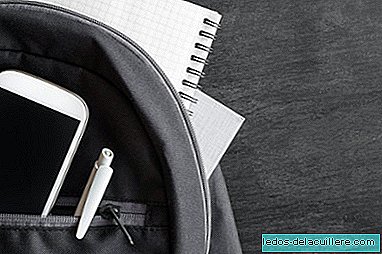
Twelve million French students returned to the classroom this week. This year, with the ban by law of the use of phone, tablet or smartwatch throughout the school, to those under 15 years old. According to the French government "to detoxify young people, because of the excessive use they make of mobiles."
And in Spain? There is no pre-established norm and it is the decision of each educational center to allow the entry of technological devices into the classroom. We have talked with experts in education and technology to meet what do you think about the use of mobile phones in schools. Should it be banned or taught to use it as another work tool?
Controversy over the use of mobile phones in schools
This measure has sparked many debates in France. On the one hand, there are those who defend this new measure, because they believe that the use of mobile phones disturbs the attention capacity of students in class, the school climate and reduces physical activity at recesses, without forgetting their exposure to violent and pornographic content .
But detractors believe that this measure will not change anything and insist on the difficulty of the centers to enforce the law.
In Spain there is no similar regulation and the competences in this area depend on each Autonomous Community. Most have been banning the presence of smartphones in class, although giving certain decision autonomy to schools, which is also what most teachers propose.
Something that all experts agree on is that the mobile is a reality and has come to stay (at age 12, three out of four children have a cell phone and at 15, 94%), so we have to learn to live with him, putting rules of use for our children before buying one.
We asked Jorge Flores Fernández, director of Friendly Screens and expert in the proper use of ICT, what are, in his opinion, the pros and cons of this measure in France.
"I think it is a wise measure because it prohibits its use throughout the school but not as an educational method, which means that the teacher can use the smartphone for an activity that decides to work in class. And they are also excluded from prohibition its use in cases of assistance to children with some kind of special need. "
Still, he adds that the idea must be nuanced:
"A detox diet is fine (thanking the body and the mind), that the children know that there is no need to always be connected at all times, although by prohibiting it by law, the opportunity to work with children is lost containment, learn to use the mobile with responsibility and be aware of when they should park it. "
This computer expert in the good use of technologies by young people, points out the advantages of the mobile ban:
Improvement of discipline control. By not having the distraction of the mobile, children will participate more actively in traditional academic activities (without technology).
Download the responsibility which it meant for schools, and also for teachers, What to do with mobiles. Its use was already being banned in many schools, but now the measure is backed by law, so they have a compelling reason against criticism from parents and students.
Force the children not to be with the mobile at all times and they learn that it is necessary to rest from it and nothing happens because they are not always connected. It forces them to reflect, to disconnect at some point so as not to have the feeling that it is necessary to always be on-line.
In addition, he points out that does not support as an argument against its prohibition the need of parents to be in constant contact with their children.
"When we were little we didn't have mobiles and our parents could give us an urgent message if necessary, through the school. And now it can be done the same."
Conclusion:
"I am in favor of banning inappropriate use of mobile phones in class, but in favor of their use as an educational method."
Against the use of mobile phones: they cause distraction, antisociability and sedentary lifestyle

Among the negative effects of cell phone use in classrooms and at school, experts point out:
1. Loss of relationships with friends. The psychologist Sherry Turkle, international reference in the study of relations between people and technology, suggests that the school is one of the places where the telephone should not enter. Patio included, since the mobile promotes zero direct contact with friends and therefore the loss of empathy.
And, in the case of the little ones, the problem is that they can't even lose something if they don't develop it. That is, after studying the data of more than 14,000 young people over three decades, he advocates regaining the ability to talk instead of consulting social networks at recess or sending messages to your friends at the end of class, in instead of talking to them when you have them nearby.
"At school, children struggle to form true friendships. Screen time, their use, but also the mere presence of technology, has impeded their emotional development. The result is a lack of empathy or their ability to relate by listening and learning , which will torment them throughout their school years, will follow them to the workplace. "
2. Reduce school performance. The mobile causes lack of discipline in class and less concentration. Teachers talk about having to face mobile phones to capture the attention of their students, who take the slightest carelessness to look at their social networks. Thus, by not paying attention in class their concentration is not in the studies.
A study by the London School of Economics and Political Science has concluded that the use of mobile phones in classrooms especially affects students with poor performance. The research also indicates an improvement in performance in students with special educational needs and those of lower economic level, when they stopped using their mobiles in class.
3. Causes attention deficit. Manfred Spitzer, neuroscientist at the Stuttgart Psychiatric Clinic, talks about 'digital dementia' which can lead to the abusive use of social networks among young people, which may involve attention deficit and depression. Every like on Instagram or whatsapp that the boy receives dopamine secretes, which causes teenagers increasingly vulnerable to the need for approval and addiction to updates of their networks.
4. Promotes sedentary lifestyle. When they prefer to be seated consulting their mobiles or playing with them instead of playing sports or participating in more creative activities.
5. Power economic differences. Having the latest model, with more capacity or the larger screen ... Having a better mobile for children begins to be a status symbol and increases prestige among students and peers, harming those who cannot have it or their parents They don't want me to have him.
In favor: a new learning tool and improvement of digital skills

But there are also professors who prefer to use technology instead of attacking it, understanding that it can help their classes reach their students better.
The Proyecta Platform, which brings together teachers who promote the use of new technologies in the classroom, explains that they do not talk about mobile-learning (set of teaching-learning methodologies exclusively through mobile technology to educate and learn at any time and place) but of "Use the mobile as another tool in the classroom such as computers, tablets, books or paintings."
For these teachers, it is undeniable that there are multiple advantages and challenges in the use of this technology in the classroom, and it talks about the opportunities of its use:
1. It is a way to learn how to make good use of mobile phones. Within class you can set standards that must be met. Just as teachers know how to use this technological device, they can show it to their students. In addition, this allows security issues to be worked on in a real way and to emphasize digital competence.
2. Offers more flexibility in Internet access and thus be able to perform connected tasks without having the computer room. This opens up a world of possibilities from the desk or the place where the student is: access teacher documents, read the newspaper, consult and participate in the classroom blog, learn to search, use the dictionary, create, edit and publish text, audio, image content ...
3. Use of technological educational tools. You can work with augmented reality within the classroom, QR, perform evaluations or quizzes at the moment, complete projects with the use of social networks, use of specific applications by subject or competence.
4. Increase motivation and participation. The use of mobile phones allows a diverse communication according to the needs of each student, which allows the methodology to be customized according to their needs, as well as the way of working or consulting.
5. It allows you to track the teaching-learning method. It can allow continuous evaluation and students can keep their own daily log of activities, plan the study in time and calendar, record their ideas, etc.
Xataka also approves its didactic use and sees the mobile as an opportunity in the classroom and in education.
Conclusion
The truth is that there is no single recipe, but that the mobile, like any other pedagogical element, can be positive or negative according to the needs of students, teachers, learning objectives, activities to be carried out.
And beyond its pedagogical use, the last decision of when to buy a mobile phone for our children and whether to allow them to take it to school or not, is always from the parents. Both at home and at school, it is important to manage their use, so that children make reasonable use of the devices and that the experience is safe and positive.
Photos | iStock
In Babies and More | Children hooked to the mobile: seven tips to avoid addiction to screens in summer, the Canary Islands will implement two hours of video games in the classroom, an idea that everyone does not like, should mobile phones be banned in schools?












